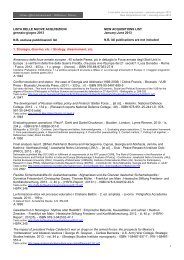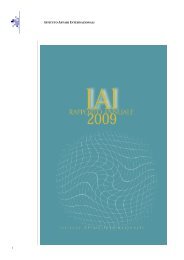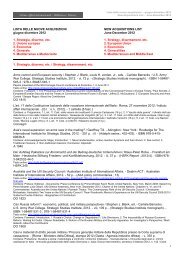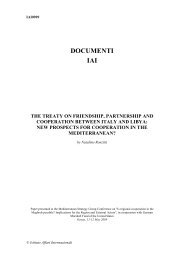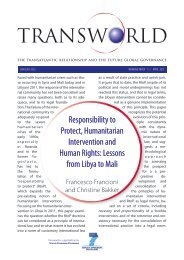La minaccia NBCR - Istituto Affari Internazionali
La minaccia NBCR - Istituto Affari Internazionali
La minaccia NBCR - Istituto Affari Internazionali
Create successful ePaper yourself
Turn your PDF publications into a flip-book with our unique Google optimized e-Paper software.
EXECUTIVE SUMMARY<br />
The objective of this study is to evaluate the Italian system of management of CBRN risks<br />
and to propose some lines of intervention that could improve management capabilities in the<br />
event of a CBRN emergency.<br />
A technical description of these events and their effects (Chapter 3., Appendix) is provided<br />
alongside an evaluation of the probability of their happening based on some recent case<br />
studies and initiatives taken by policymakers and stakeholders (Chapter 1.).<br />
Study of the Islamic terrorism factor confirms, also for the Italian case, that there is a<br />
concrete possibility of a non-conventional attack against the civilian population. The risk<br />
level for this threat in Italy is, in fact, medium-high. There are a number of reasons for this,<br />
including Italy’s participation alongside the United States in the war on international<br />
terrorism and a strong concentration of Christian symbols and artwork, emblems of Western<br />
civilisation, history and culture, in the country. In addition, due to Italy’s geographic position<br />
and conformation, it is a thoroughfare for the flow of illegal goods and immigrants towards<br />
Europe, making it a possible operational area, either as a base or in transit, for international<br />
terrorist cells. Finally, there is the presence in Italy of numerous Muslim immigrants, who<br />
provide a recruitment base, as well as large crowds of tourists, who facilitate the presence<br />
and movement of terrorists.<br />
The importance of the CBRN issue can be evaluated both from the “objective” vulnerability<br />
perspective linked to the nature of the threat – paying attention to the terrorism factor – and<br />
from the “subjective” vulnerability perspective of Italy’s system of response – paying<br />
attention to the institutional critical points and the rationalisation of its technical-operational<br />
capabilities.<br />
Outstanding among the first are those linked to the highly destructive potential of these<br />
attacks.<br />
VII



